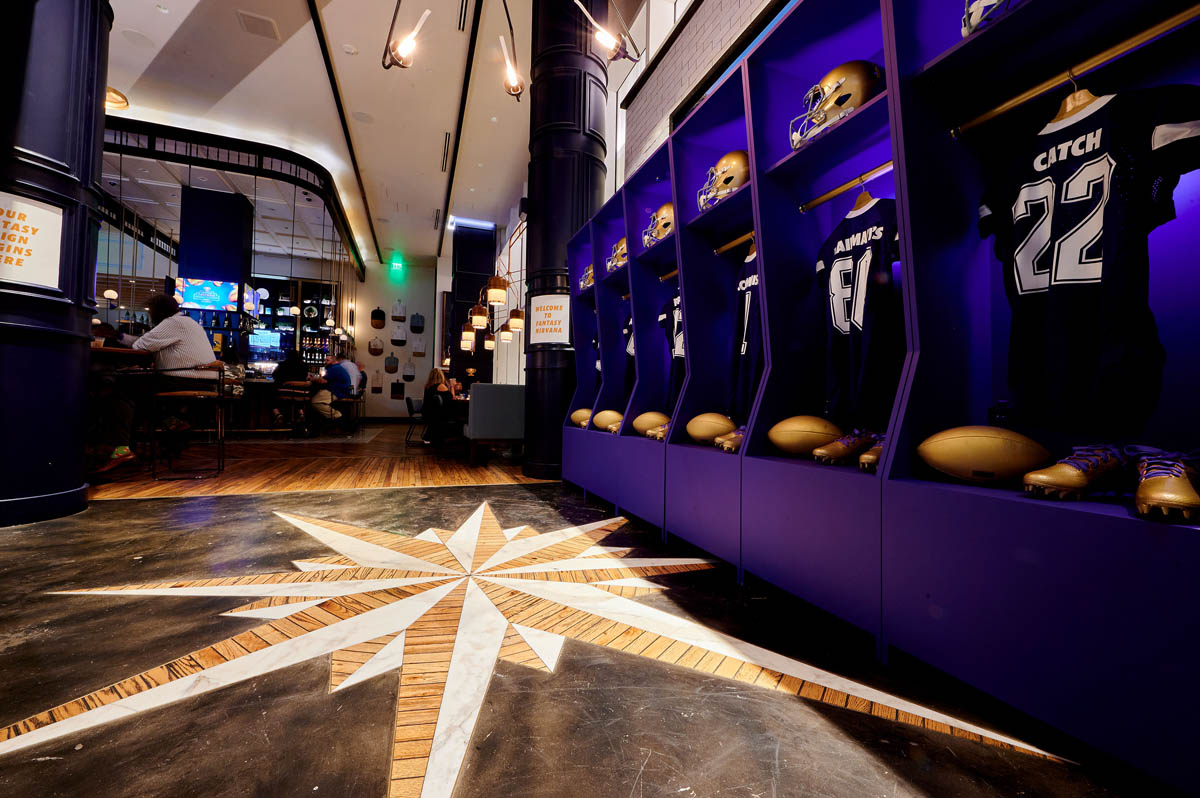
Charlie Eder is senior director of events and experiential marketing at Yahoo, where he currently heads up a mid-sized team that produces B-to-B, B-to-C, and internal events. The Chicago-based industry pro chatted with The Vendry about the importance of maintaining a network, thinking outside the box when booking venues, and having a backup plan (or two) in place.
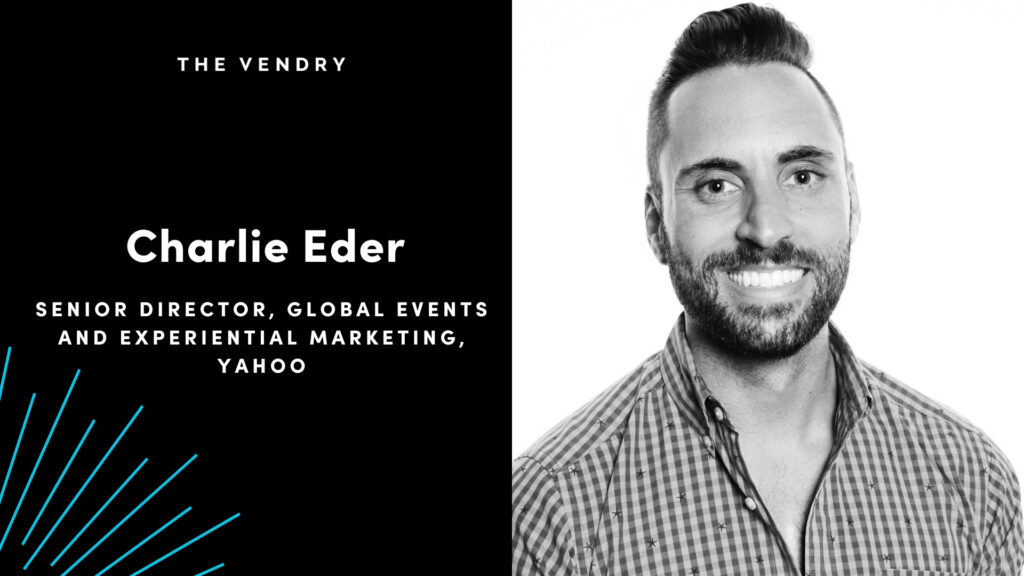
I lead global events and experiential marketing at Yahoo, which includes events and experiences across the business — B-to-B, B-to-C, and employee experiences. We are truly a global marketing team, and we work closely with our regional partners in EMEA, LATAM, APAC and so on. Our hope is also to get back to some more regional-focused customer experiences in those markets as the world opens back up, especially on the B-to-B side this year. We are looking into some cool customer-first experiences in all of those markets so stay tuned!
I pay attention to social media, but I also prioritize personal networking by keeping in touch with a lot of people I've worked with in the past: folks who've gone on to other companies, folks who've left an agency, folks who went into a different part of the event industry. We talk about event inspiration and creativity, as well as what we’re seeing on the ground for different events. It’s interesting to see how teams responded to COVID, and what event calendars look like in this new normal. And then not surprisingly, I do read The Vendry and the Drum and Adweek to see what other folks in the industry have done.
Another big inspiration for me and one I’ve always found to be really helpful is awards programs hosted by publications like Event Marketer or BizBash. By examining the winning proposals, I discover new agencies, new vendors, and even new design or experience elements to research. As a team, we'll look at them and try to take away what we thought was interesting or unique that we can make our own.
So much has changed during COVID. A lot of the big agencies and vendors we used before either pivoted, expanded, or, in some cases, may have had to shut down. As we moved to a virtual world, we had to find new vendors with expertise in digital or immersive worlds like gaming to bring our ideas to life, but on a screen.
We recently rebranded and became an independent company as Yahoo. We've had a lot of transition as a company over the last few years and so it's even more important now that we are working with partners and agencies and vendors who get us. That's been a big part of settling down for the year —having those conversations, identifying areas of strength, and finding partners we can learn from.
As a standalone brand, we have the opportunity to bring that brand to life through venues that we choose and through the experience that we create. We definitely have the opportunity under Yahoo to look for something a little bit more playful, a little bit more off-the-beaten path, maybe a little bit more scrappy even. So it's not highbrow premium, it's fun and playful. The change to Yahoo has given us the opportunity to cast a wider net in the type of venue that we find or even the type of experience we create. Whether it's an abandoned space or a raw space or it’s a store that you didn’t even think you could create into an experience, we’re excited to consider totally out-of-the-box options.
As we explore smaller, intimate, bespoke experiences, we’re also looking for interesting and compelling partnership opportunities. In the past, we've partnered with high-end watch brand Shinola, hosting a small client event at one of their stores. This allowed both brands to have a real, recognizable presence, and even provided our guests with cool Shinola-branded gifts to take home. When you think beyond restaurants and event venues, you’re able to go further with that experiential element.
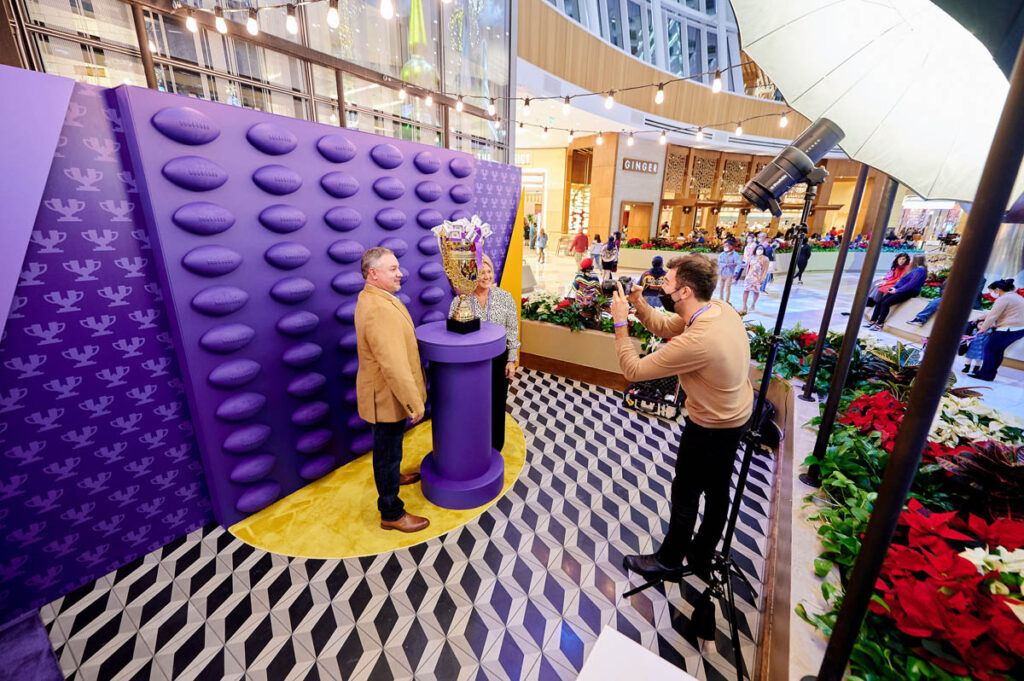
I’m a fighter. I'll fight for what I think is right or what we need to execute an experience. Someone may say we only have X amount of budget, but I may say to really execute the experience right we need this, so I'm going to fight for that money. Having a strong opinion doesn't mean you have to be like a bull in a china shop, though. I’ve learned there are polite and nice ways and smart ways to do that in a company.
I also like to take risks, especially when it comes to events. For instance, we've done Newfronts over the years, which are traditionally when stakeholders come on stage and give their presentation, and we've done those, but we've also done full-on street parties or taken over a pier and have done the presentations through immersive dance and storytelling. You're taking a risk because it's not your typical B-to-B presentation. I think being comfortable taking some risks in the B-to-B space, particularly where there's a traditional way of doing things. Even last year we invested in XR and AR and in new ways to tell our story in a virtual world that was really well received. We could have done your standard normal production and had a couple of cameras and called it a day. But instead we really pushed ourselves to work with the best partners and tell a much more creative story.
I also think in risk taking there's also a little bit of testing and learning, which I'm also very keen on doing. I'm all for trying something new or trying something new on a smaller scale and seeing how it works.
The team recently produced the Yahoo Fantasy Football Championship [in December]. It was the first event we’ve done specifically for consumers—an in-person experience over a game day weekend where people could network and compete against other fantasy players. It was a sweepstakes on social, and winners were flown to the MGM National Harbor in Maryland for this awesome two-day experience with other competitors and talent to watch the games, use Yahoo Fantasy, and walk away with cool swag.
That one, of course, had a lot of COVID precautions from proof of vaccination to testing on site when you arrived. We had to go through the dynamics of putting a really solid safety-first COVID plan in place, plus a backup plan for a virtual event in case we ran into a COVID-related issue. The team did a great job of keeping their eye on the ball, thinking safety first, but at the same time creating a really awesome consumer experience that at the end of the day, thankfully, didn't have any COVID cases or issues.
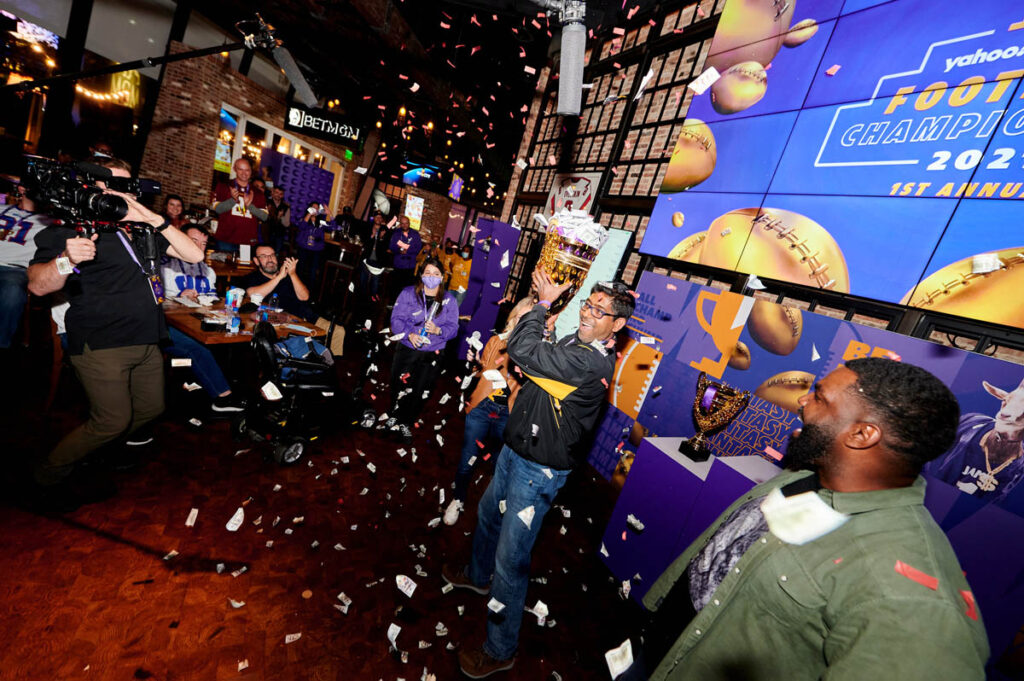
A pretty good marker for success is a really smooth, seamless process from beginning to end. And that's for any consumer journey. But I think it is even more important for an event journey. If I get stuck on the registration or I get stuck in line, it negatively affects the whole event experience. You could have the most creative experience but if it doesn't work or if it's not easy to understand or if the flow breaks, then at the end of the day that's what the attendees are going to remember.
I think ultimately what that always comes down to even more keenly for me and the team, because we do work horizontally, is we almost always have a different audience. And so you have to ask yourself who the audience is. A lot of times we'll do a really different experience for the employees than we would ever do for C-suite clients. We spend a lot of time at the beginning of any conversation asking who's our audience? What's the takeaway? That's all pretty basic stuff, but you get lost in it sometimes when you have this cool creative idea. Because we do work so horizontally, let's remind ourselves who we're talking to here.
I went to grad school in Washington, D.C., to work in politics. I thought that's what I wanted to do. And then I eventually landed at a think tank. And I just fell into events. They did a regular series of political events where you have thought leaders come in or different topics that we covered. We did a couple of big events. And I was like, I think I'm actually liking this. Then I moved to Chicago and found a job at an event agency and was thrown into it where you're working 20 hours a day and it's very much agency life. You have three clients you’re managing, big, massive million-dollar events with big brands. And that was really what threw me into the nitty-gritty work of event logistics, production, etc. because you got such a breadth of the event world, depending on what your line producer role was or who your client was. That was definitely an eye-opening experience.
AOL was one of my clients and they brought me over on the brand side. And I've now been here since—through the acquisitions with Verizon and Verizon Media, and we were a different name for a while. And now we're Yahoo. So I've been at the same company, even though it looks like I've been at six different ones. But that's been the interesting part of it. It's felt like you're learning something new and working in a new place, so that's actually kept it fresh and interesting and exciting. Now it's exciting to be an independent company under one brand and can move forward now in that direction.
Expand your network. Expand your circle.
Apply to Circles - our exclusive, curated networking groups for top event professionals.
I would say be open minded and a go-getter. I think the people we're looking for are folks who are very open minded to learning new things. Some of the folks who've been really successful the last couple of years have been like, I don't know how to use this weird tech platform you're making me use to do registration, but I'm going to roll up my sleeves to learn. There's eagerness and open-mindedness to learn, teach yourself, dig under the hood. But then also being open minded to change. I think being a go-getter, being open minded, being willing to teach yourself and jump in and learn are probably good pieces of advice.
Offer your services or volunteer to work on a few events. I think getting your feet wet and getting your hands dirty a little bit, but it doesn't necessarily have to be something formal. Because I think you also get a better, more diverse pool of candidates too. So you're not just narrow-mindedly looking at folks who were able to get a formal internship at the big places.
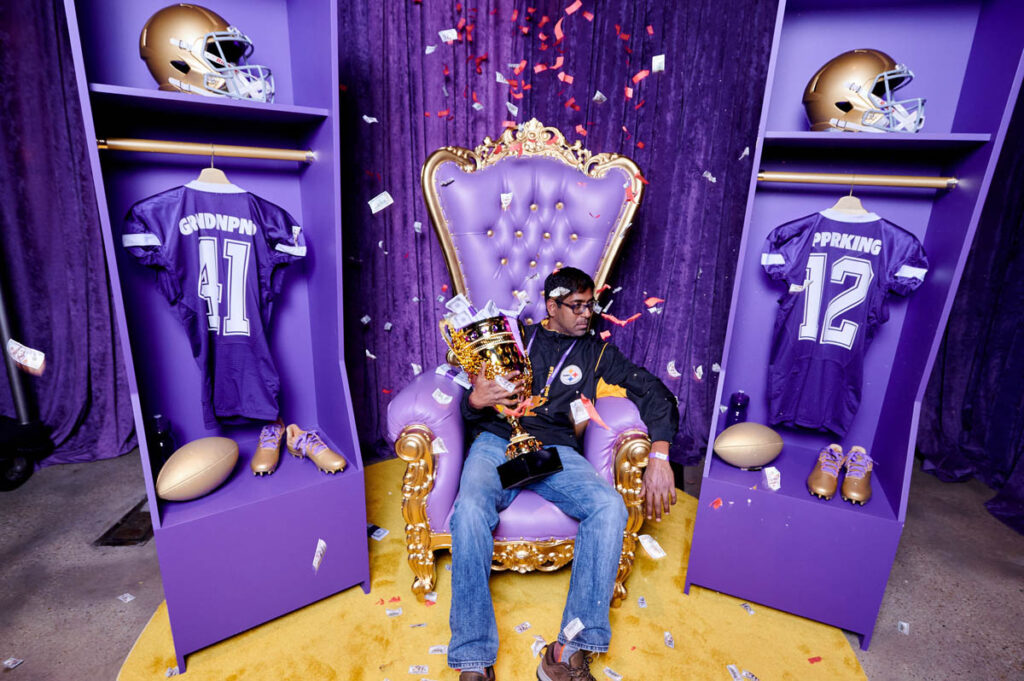
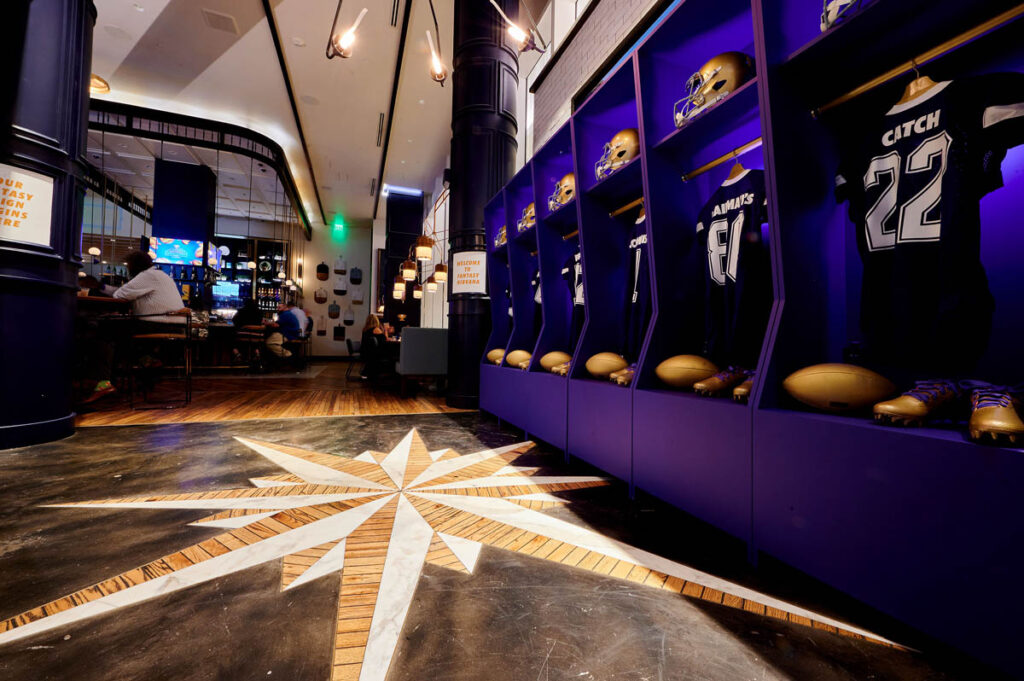
The Sydney Opera House
Barcelona
With a glass of wine. Kim Crawford Sauvignon Blanc, if you want to be specific.